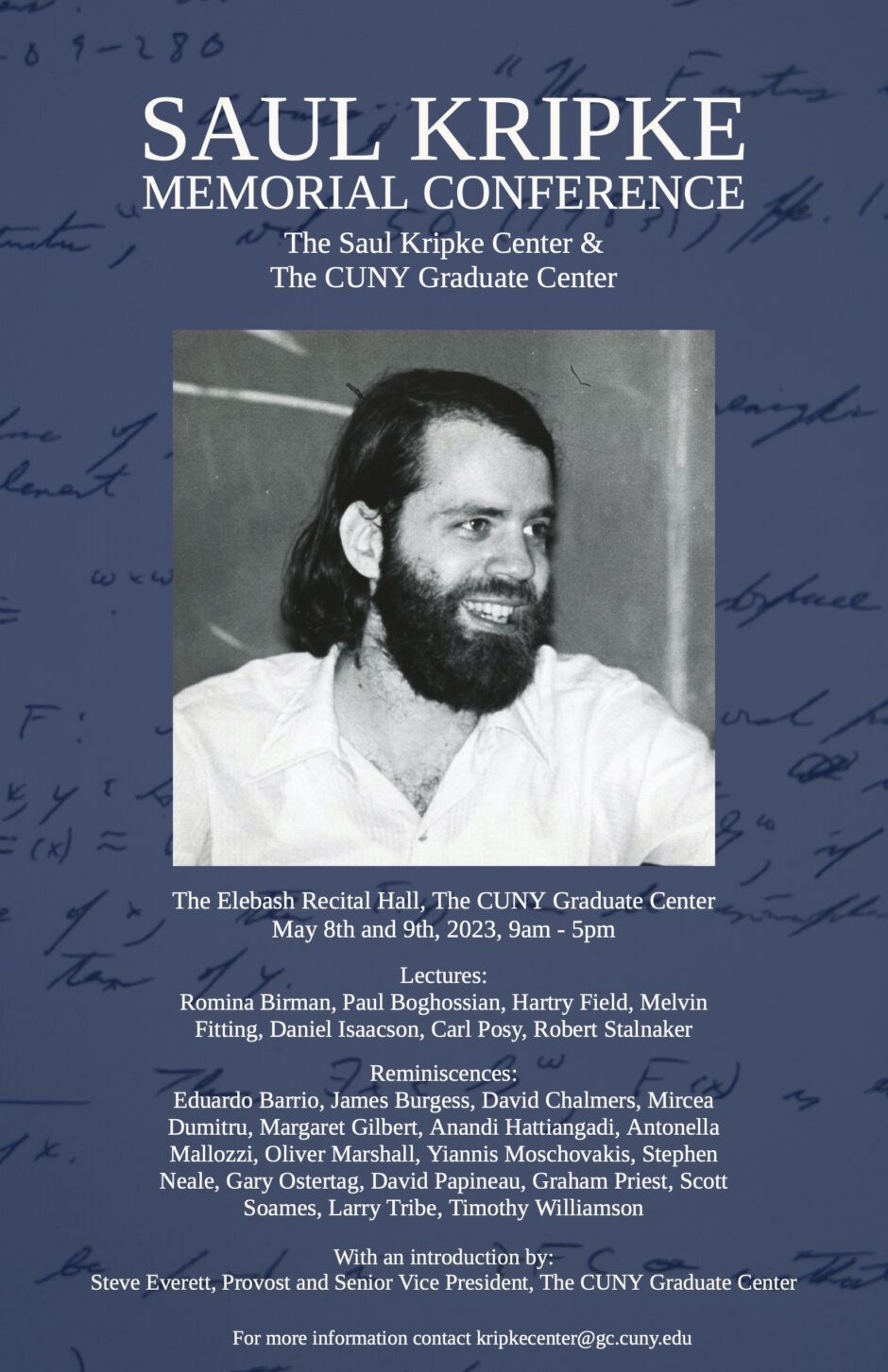The Saul Kripke Center is hiring for the vacant position of Assistant Director. Details here.
Author: Yale Weiss
New Book: Saul Kripke on Modal Logic
A new book celebrating Saul Kripke’s singular contributions to modal logic, Saul Kripke on Modal Logic, has just been published by Springer. It was edited by Yale Weiss and Romina Birman.
The volume features two previously unpublished pieces by Saul Kripke, a brief intellectual biography recounting the story of how Kripke became involved in modal logic, and a number of contributions dealing with the cutting edge of modal logic.
Yale Weiss named as new Director of the Saul Kripke Center
Yale Weiss has succeeded Romina Birman (née Padró) as the Director of the Saul Kripke Center. Details here.
The Myth of the Ungiven
The Saul Kripke Center is pleased to announce that Kit Fine (Silver Professor and University Professor of Philosophy and Mathematics at NYU) will deliver the 6th Saul Kripke Lecture on October 31st, 2024, from 4:00 to 6:30 pm. The talk is free and open to all, and will be held in-person only at the CUNY Graduate Center (Room C198).
Title: The Myth of the Ungiven
Abstract: The notion of a borderline case has been thought to be central to our understanding of vagueness. I shall argue that there is no intelligible notion that can play this role and that an alternative framework for understanding vagueness needs to be found.
Modal definability and Kripke’s theory of truth
The Saul Kripke Center is pleased to announce that James Walsh (Assistant Professor, Philosophy, NYU) will deliver a talk on Friday, May 10th, 2024, from 4:15 to 6:15 pm at the CUNY Graduate Center (Room 9207). The talk is free and open to all.
Title: Modal definability and Kripke’s theory of truth
Abstract: In Outline of a Theory of Truth, Kripke introduces some of the central concepts of the logical study of truth and paradox. He informally defines some of these–such as groundedness and paradoxicality–using modal locutions. We introduce a modal language for regimenting Kripke’s informal definitions and characterize the modally definable sets. Though groundedness and paradoxicality are expressible in the modal language, we prove that intrinsicality–which Kripke emphasizes but does not define modally–is not.
Zoom Access: please follow this link.
New Visiting Scholar: Lorenzo Rossi

Lorenzo Rossi (DPhil, University of Oxford), assistant professor at the University of Turin, joins the Saul Kripke Center as a Visiting Research Scholar through June 27, 2024, under the auspices of the PLEXUS program. He works on topics at the intersection of logic, epistemology, the philosophy of language, and the philosophy of mathematics, and more specifically on formal theories of truth, vagueness, indicative conditionals, and quantifiers.
New Visiting Scholar: Matteo Plebani

Matteo Plebani (PhD, Ca’ Foscari University, Venice), associate professor at the University of Turin, joins the Saul Kripke Center as a Visiting Research Scholar through June 30, 2024, under the auspices of the PLEXUS program. He works on topics at the intersection of the philosophy of language and the philosophy of mathematics: counterpossibles in relative computability theory, truthmaker semantics, semantic paradoxes, and structuralism in the philosophy of mathematics.
Young Scholars Series: C. L. Johnson
The Saul Kripke Center is pleased to announce that C. L. Johnson (PhD student, Philosophy, CUNY Graduate Center) will deliver the tenth Saul Kripke Center Young Scholars Series talk on Thursday, February 22, 2024, from 4:15 to 6:15 pm at the CUNY Graduate Center (Room C197). The talk is free and open to all.
Title: On the existence of all possible worlds
Abstract: Why is there something rather than nothing? In “Why Anything? Why This?”, Derek Parfit canvasses several ultimate explanations for existence and their pitfalls, conceding that the possibility for any cogent answer to the question is unlikely. I nevertheless provide such an explanation first by enumerating foundational assumptions common to most, if not all, explanations. From these assumptions, I argue against two popular views regarding the existence of our world: (1) the existence of a necessary being responsible for our world’s creation and (2) the brute existence of our world. Then, by developing an account against the coherence of nothingness, I critique the possibility of Absolute Nothingness, the view that the simplest reality is one devoid of anything. In so doing, I underscore the difference between ontological and explanatory simplicity, showing that though a finite reality (in either the number of worlds or scope) is ontologically simpler than an infinite one (in both number and scope), such a finitude is explanatorily more complex and arbitrary. I then argue that an unbounded Maximality of infinitely many, spatiotemporally disconnected worlds (the opposite of Absolute Nothingness) is the simplest ground (or default state) for our existence, effectively requiring no further explanation.
Saul Kripke Memorial Conference

The Saul Kripke Center will host a memorial conference honoring Saul Kripke (1940-2022) at The CUNY Graduate Center on May 8th and 9th, 2023. The conference program is available here. Registration for attending in person is not required, but attendees will have to comply with the Graduate Center’s Building Access Policy. Although the conference will be a mainly in person event, a livestream is also available; for this, please register.
50 Years of Naming and Necessity

The Saul Kripke Center is pleased to announce that a conference celebrating the 50th anniversary of the first publication of Saul Kripke’s masterpiece, Naming and Necessity, will be held at the CUNY Graduate Center on December 12th and 13th. For registration and additional details, please consult philevents.org/event/show/103858, the book of abstracts, and the schedule.




